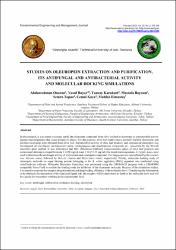Studıes On Oleuropeın Extractıon And Purıfıcatıon, Its Antıfungal And Antıbacterıal Actıvıty And Molecular Dockıng Sımulatıons

Göster/
Erişim
info:eu-repo/semantics/openAccessTarih
2023Yazar
Onaran, AbdurrahmanBayar, Yusuf
Karakurt, Tuncay
Bayram, Mustafa
Topuz, Semra
Kaya, Cemal
Elmastas, Mahfuz
Üst veri
Tüm öğe kaydını gösterKünye
Onaran, A., Bayar, Y., Karakurt, T., Bayram, M., Topuz, S., Kaya, C., & Elmastaş, M. (2023). STUDIES ON OLEUROPEIN EXTRACTION AND PURIFICATION, ITS ANTIFUNGAL AND ANTIBACTERIAL ACTIVITY AND MOLECULAR DOCKING SIMULATIONS. Environmental Engineering & Management Journal (EEMJ), 22(2).Özet
In this research, it was aimed to extract, purify the oleuropein compound from olive leaf and to determine its antimicrobial activity against microorganisms that cause diseases in plants. For this purpose, olive leaf crude extract, partially purified oleuropein, and purified oleuropein were obtained from olive leaf. Antimicrobial activity of olive leaf products and commercial oleuropein was investigated on Clavibacter michiganensis subsp. michiganensis and Xanthomonas axonopodis pv. vesicatoria by the 96-well microtiter plate method. It was determined that MIC (Minimum Inhibitory Concentration) values of olive leaf products and commercial oleuropein ranged between 1:1 (50 mg/mL) and 1:16 (3.125 mg/mL) for tested microorganisms. 1-2 g/mL doses were used to determine the antifungal activity of leaf extracts and oleuropein compound. The fungus species most affected by the extracts was Alternia solani, followed by Botrytis cinerea and Rhizoctonia solani, respectively. Finally, molecular docking study of oleuropein molecule on sugar binding protein belonging to the R. solani agglutinin (RSA) organism was conducted using AutoDockvina software. Molecular Dynamics Simulation was performed using the GROMACS program with a CHARMM compatible Force Field to confirm the binding mode for inhibition of the oleuropein molecule. Because of the simulation studies, it is aimed to examine the receptor-drug interactions and drug loading efficiency at the molecular level. Considering the information to be obtained, the interaction of the simulated ligand with the receptor will be understood in depth at the molecular level and will be a guide for researchers working in the experimental field.

















